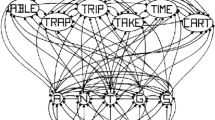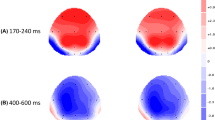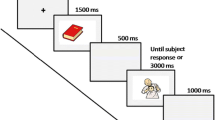Abstract
Evidence that lexical access is guided by context was obtained using a cross-modal, semantic priming paradigm. Subjects heard homonyms presented in context that favored only one meaning and made lexical decisions to contextually appropriate, inappropriate, or unrelated target words that were presented visually. In Experiment 1, responses were facilitated for only the contextually appropriate targets, at both 50 and 200 ms interstimulus intervals. In Experiment 2, the range of interstimulus intervals was increased and subjects were encouraged to consider multiple meanings of homonyms. Even with this orientation, lexical decisions were facilitated for only the contextually appropriate targets. This pattern of selective access was maintained across the full-time course of automatic activation, suggesting that the lexicon operates interactively rather than autonomously. These findings indicate that multiple, context-independent access of word meanings should not continue to be viewed as a mandatory operation of the language comprehension system.
Similar content being viewed by others
References
Burgess, C., & Hollbach, S.C. (1988). A computational model of syntactic ambiguity as a lexical process. InProgram of the tenth annual conference of the cognitive science society. Hillsdale, New Jersey: Lawrence Erlbaum Associates.
Clark, R., & Gibson, E. (1988). A parallel model for adult sentence processing. InProgram of the tenth annual conference of the cognitive science society. Hillsdale, New Jersey: Lawrence Erlbaum Associates.
Cottrell, G.W. (1985). A connectionist approach to word sense disambiguation.Dissertation Abstracts International, 46(6), 1979B. (University Microfilms No. 8516464).
Fodor, J.A. (1983).The modularity of mind. Cambridge, Massachusetts: The MIT Press.
Forster, K.I. (1979). Levels of processing and the structure of the language processor. In W.E. Cooper & E.C.T. Walker (Eds.),Sentence processing: Psycholinguistic studies presented to Merrill Garrett. Hillsdale, New Jersey: Lawrence Erlbaum Associates.
Garnham, A. (1985).Psycholinguistics central topics. New York: Methuen, Inc.
Glucksberg, S., Kreuz, R.J., & Rho, S.H. (1986). Context can constrain lexical access: Implications for models of language comprehension.Journal of Experimental Psychology: Learning, Memory, and Cognition, 12, 323–335.
Jones, J.L. (1989). The interactive lexicon: Context-dependent access of homonym meanings across the time course of activation. Doctoral dissertation, University of California, Los Angeles. (University Microfilms International #9010628).
Jones, J.L. (unpublished).Frequency bias ratings of homonym meanings.
Kiger, J.I., & Glass, A.L. (1983). The facilitation of lexical decisions by a prime occurring after the target.Memory & Cognition, 11(4), 356–365.
MacKay, D.G. (1987).The organization of perception and action. New York: Springer-Verlag.
Marslen-Wilson, W.D. (1987). Functional parallelism in spoken word-recognition.Cognition, 25, 71–102.
McClelland, J.L. (1986). The programmable blackboard model of reading. In J.L. McClelland, D.E. Rumelhart, & the PDP Research Group (Eds.),Parallel distributed processing (Vol. 2, pp. 122–169). Cambridge, Massachusetts: The MIT Press.
McClelland, J.L., & Elman, J.L. (1986). The TRACE model of speech perception.Cognitive Psychology, 18, 1–86.
Morton, J. (1969). The interaction of information in word recognition.Psychological Review, 76, 165–178.
Morton, J. (1979). Facilitation in word recognition: Experiments causing change in the logogen model. In P.A. Kolers, M.E. Wrolstad, & H. Bouma (Eds.),The processing of visible language (Vol. I, pp. 259–268). New York: Plenum Press.
Nelson, D.L., McEvoy, C.L., Walling, J.R., & Wheeler, J.W., Jr. (1980). The University of South Florida homograph norms.Behavior Research Methods & Instrumentation, 12(1), 16–37.
Onifer, W., & Swinney, D.A. (1981). Accessing lexical ambiguities during sentence comprehension: Effects of frequency of meaning and contextual bias.Memory & Cognition, 9, 225–236.
Rayner, K., & Pollatsek, A. (1989).The psychology of reading. Englewood Cliffs, New Jersey: Prentice Hall, Inc.
Rubenstein, H., Garfield, L., & Millikan, J.A. (1970). Homographic entries in the internal lexicon.Journal of Verbal Learning and Verbal Behavior, 9, 487–492.
Seidenberg, M.S., Tanenhaus, M.K., Leiman, J.M., & Bienkowski, M. (1982). Automatic access of the meanings of ambiguous words in context: Some limitations of knowledge-based processing.Cognitive Psychology, 14, 489–537.
Simpson, G.B. (1981). Meaning, dominance, and semantic context in the processing of lexical ambiguity.Journal of Verbal Learning and Verbal Behavior, 20, 120–136.
Swinney, D.A. (1979). Lexical access during sentence comprehension: (Re)consideration of context effects.Journal of Verbal Learning and Verbal Behavior, 18, 645–660.
Author information
Authors and Affiliations
Additional information
This research was conducted as part of a doctoral dissertation submitted to the University of California, Los Angeles. The Chair of the dissertation committee, Thomas D. Wickens, was especially helpful and supportive during every stage of this project. The assistance provided by committee members (Patricia Cheng, Victoria Fromkin, Eric Holman, Donald MacKay, and John Schumann) is also appreciated.
Rights and permissions
About this article
Cite this article
Jones, J.L. Early integration of context during lexical access of homonym meanings. Current Psychology 10, 163–181 (1991). https://doi.org/10.1007/BF02686773
Accepted:
Issue Date:
DOI: https://doi.org/10.1007/BF02686773




